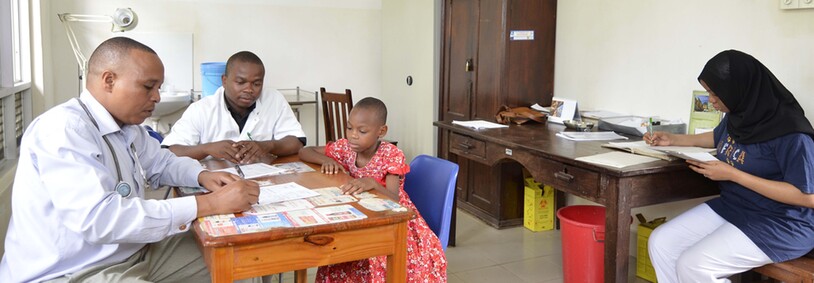
Health – one of the core areas covered by the recently adopted sustainability goals
30.09.2015 – Human health is a key factor for the development of a society.
The health situation of people has improved all over the world, but according to the World Health Organisation, around 17,200 children under the age of five still die each day. Year after year, millions of people perish as a result of infectious diseases, with diarrhoea alone claiming 1.5 million lives. With their sustainability goals, the UN and the governments of its 193 member states have now committed to significantly improving the health of all people in the next 15 years.
Within the German Government, this global task falls under the purview of the Federal Ministry for Economic Cooperation and Development (BMZ). On behalf of BMZ and other commissioning parties, the Deutsche Gesellschaft für Internationale Zusammenarbeit (GIZ) is supporting the health sector in some 80 countries. More than 13 million people in seven developing countries in Asia and Africa benefited from outpatient services and health centres in the years 2012 and 2013 alone. Nearly half the patients were women. GIZ has also provided further training to more than 42,000 health professionals in over 20 countries. They make a decisive contribution to improving health care provision.
‘We are working to strengthen the health systems at all levels of society – from advising decision-makers to providing actual medical treatment for the population in rural areas’, explains GIZ expert Inge Baumgarten. Prevention plays an important role. ‘All over the world, around 145 million people in developing countries have access to staple foods with vitamin supplements in order to prevent deficiency diseases. This benefits women and children in particular, for instance in the form of edible oil supplemented with vitamin A. The vitamin supplement prevents night blindness and growth disorders in children. GIZ is cooperating with industrial enterprises to make this possible’, Baumgarten adds.
In the Philippines, more than 2.5 million primary school children are participating in a school meal programme supported by GIZ. The programme helps children who are underweight and prevents tooth decay and worm diseases.
In order to achieve as great an impact as possible, GIZ’s work systematically involves stakeholders across national boundaries, for instance in the areas of education and agriculture. Baumgarten: ‘Health is the key to sustainable development – of every person and of the whole society. We are committed to this task all over the world – from prevention work through strengthening health systems to designing health insurance schemes.’